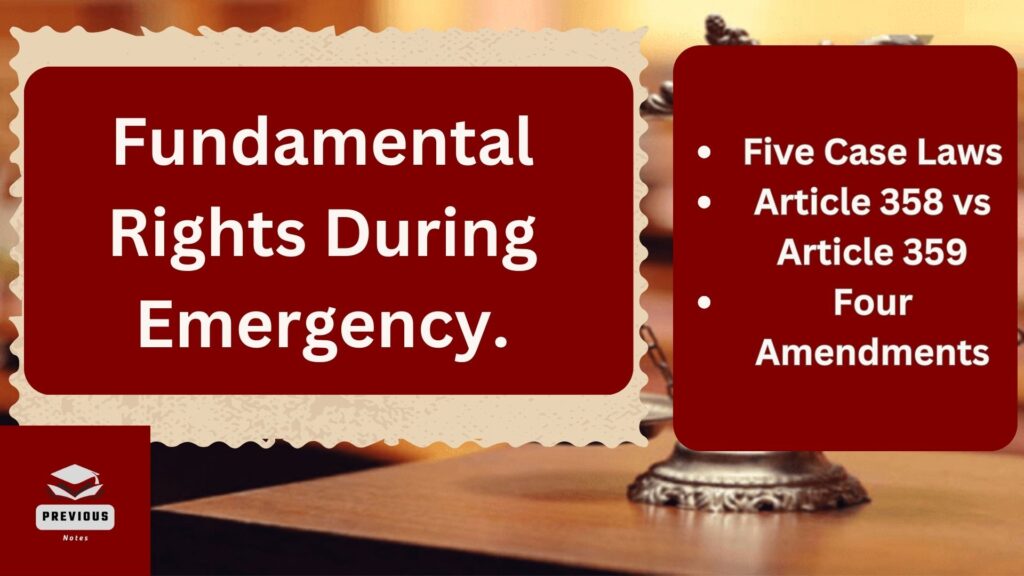Impact on Fundamental Rights During Emergency
In India, emergency provisions are provided in Part XVIII of the Constitution of India, in Articles 352, 356, and 360.
National Emergency (Article 352):
- The President can proclaim a national emergency if the security of India or any part of its territory is threatened by war, external aggression, or armed rebellion.
- The President can do so based on the advice of the Cabinet, and the proclamation must be approved by both houses of Parliament within one month.
Bare Act language of Article 352 is as under:
352. Proclamation of Emergency
Article 358
When Emergency under Article 352 of the Constitution is declared by the President, the provisions of Article 19 of the Constitution stand automatically suspended under Article 358 of the Constitution, and remain so suspended during the entire period of Emergency.
Article 358. Suspension of provisions of article 19 during emergencies
Article 359 Suspension of the enforcement of the rights conferred by Part III during emergencies
Where a Proclamation of Emergency is in operation, the President may by order declare that the right to move any court for the enforcement of such of the rights conferred by Part III (except articles 20 and 21) as may be mentioned in the order and all proceedings pending in any court for the enforcement of the rights so mentioned shall remain suspended for the period during which the Proclamation is in force or for such shorter period as may be specified in the order.
Difference between Article 358 vs. Article 359:
- Article 358 suspended rights conferred by Article 19, Article 359 suspended only remedy and not the rights.
- Article 20, Article 21 cannot be suspended during emergency.
It means that Article 358 suspend right of Freedom of Speech provided in Article 19 but Article 359 does not suspend any right but only suspend remedy, remedy cannot be claim for any fundamental right during emergency under this Article. After emergency remedy can be claimed but during emergency remedy is suspended.
Moreover, in 44th Amendment, it is clearly specified that Article 20, Article 21 cannot be suspended during national emergency and remedy for the enforcement of these right can be claimed in the Courts.
Case Laws
Makhan Singh vs. State of Punjab AIR 1964 SC 382
Court:
If a person moved any Court to obtain a relief on the ground that his fundamental rights specified in the Order had been contravened, that proceeding was barred.: It means fundamental rights cannot be claimed during emergency as presidential order under Article 359 has been passed which suspend remedy to seek fundamental rights.
If in challenging the validity of his detention order, the detenu was pleading any right outside the rights specified in the Presidential Order, his right to move any court in that behalf was not suspended, because it was outside Article 359(1) and consequently the Presidential Order: If any other right is sought other than the fundamental right, a person can move to the court. Example:
(a) Where a detenu was detained in violation of the mandatory provisions of the Preventive Detention Law, the detention order could be challenged on the ground that it was in contravention of the mandatory provisions of the Preventive Detention Law.
(b) Where the detention order was ordered malafide, the detenu could challenge the same on the ground that a malafide order was outside the scope of the Preventive Detention Law.
State of Maharashtra v. Prabhakar Pandurang Sanzgiri, AIR 1966
A person who was detained in Jail during emergency wrote a book and seek permission to publish the book, in this regard, he gave permission to the superintendent of the Jail and later wrote letter to the State Govt. both times his request was rejected. Later he filed a writ petition and Court held that there is no such rule which bar publication of the infant and ordered to publish his book.
Additional District Magistrate, Jabalpur v. Shivkant Shukla, AIR 1976 SC 1207: (1976)
no person had any locus standi to move any writ petition under Article 226 of the Constitution before a High Court for habeas corpus or any other writ or order or direction to challenge the legality of an order of detention on the ground that the order was not under or in compliance with the Maintenance of Security Act or was illegal or was vitiated by malafides factual or legal or was based on extraneous consideration. The appeals were allowed and the judgments of the High Courts were set-aside.
This judgement was criticized a lot and later overruled in the case of Justice K.S. Puttaswamy (Retd.) and Another v. Union of India and Others, AIR 2017.

Leave a Reply Cancel reply